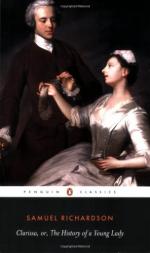’She accordingly went home. She heard the relation of your astonishing vagaries, with hands and eyes often lifted up; and with these words intermingled, Shocking creature! incorrigible wretch! And will nothing make him serious? And not being able to bear the thoughts of an interview with a man so hardened, she took to her usual chair early in the morning, and was carried to the Temple-stairs, where she had ordered her nurse before her, to get a pair of oars in readiness (for her fatigues the day before made her unable to bear a coach;) and then she was rowed to Chelsea, where she breakfasted; and after rowing about, put in at the Swan at Brentford-ait, where she dined; and would have written, but had no conveniency either of tolerable pens, or ink, or private room; and then proceeding to Richmond, they rowed her back to Mort-lake; where she put in, and drank tea at a house her waterman recommended to her. She wrote there for an hour; and returned to the Temple; and, when she landed, made one of the watermen get her a chair, and so was carried to the widow’s friend, as the night before; where she again met the widow, who informed her that you had been after her twice that day.
’Mrs. Lovick gave her there her sister’s letter;* and she was so much affected with the contents of it, that she was twice very nigh fainting away; and wept bitterly, as Mrs. Lovick told Mrs. Smith; dropping some warmer expressions than ever they had heard proceed from her lips, in relation to her friends; calling them cruel, and complaining of ill offices done her, and of vile reports raised against her.
* See Letter XXVI. of this volume.
’While she was thus disturbed, Mrs. Smith came to her, and told her, that you had been there a third time, and was just gone, (at half an hour after nine,) having left word how civil and respectful you would be; but that you was determined to see her at all events.
’She said it was hard she could not be permitted to die in peace: that her lot was a severe one: that she began to be afraid she should not forbear repining, and to think her punishment greater than her fault: but, recalling herself immediately, she comforted herself, that her life would be short, and with the assurance of a better.’
By what I have mentioned, you will conclude with me, that the letter brought her by Mrs. Lovick (the superscription of which you saw to be written in her sister’s hand) could not be the letter on the contents of which she grounded that she wrote to you, on her return home. And yet neither Mrs. Lovick, nor Mrs. Smith, nor the servant of the latter, know of any other brought her. But as the women assured me, that she actually did write to you, I was eased of a suspicion which I had begun to entertain, that you (for some purpose I could not guess at) had forged the letter from her of which you sent me a copy.
On Wednesday morning, when she received your letter, in answer to her’s, she said, Necessity may well be called the mother of invention—but calamity is the test of integrity.—I hope I have not taken an inexcusable step—And there she stopt a minute or two; and then said, I shall now, perhaps, be allowed to die in peace.




